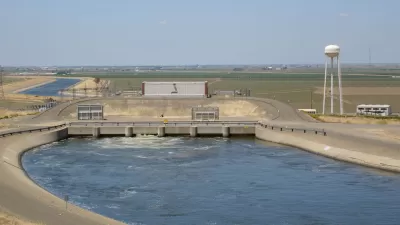California's landmark climate legislation, AB 32, ends in five years; i.e., the target year for emissions reduction is 2020, after which there will be no comparable legislation targeting a future year. SB 32 sets emission reduction goals for 2050.
"The principal author of [the 2006 climate legislation, AB 32], Sen. Fran Pavley, D-Agoura Hills, has introduced a new bill, SB 32, requiring greenhouse gases to be cut to 80 percent below the 1990 levels by 2050," writes John Howard, editor of Capitol Weekly. "The plan would come under the jurisdiction of the [California] Air Resources Board [CARB]."
California will have met the goals of AB 32 if by 2020 emissions are no greater than 1990 levels. Setting the target at 80 percent below 1990 will clearly be a tough row to hoe, "all but certain to draw national attention," writes Howard. It would "authorize state air quality regulators to establish interim benchmarks in 2030 and 2040 to make sure the reductions are actually taking place."
"The lack of post-2020 certainties has been cited as a restraining factor on investments in several areas of the [cap-and-trade] program, such as speculative participation by major financial institutions, and offset project activity for which returns are cast over a long-term horizon," according to CaliforniaCarbon.
Asked if Gov. Jerry Brown has taken a position on the bill, his spokesman stated, “While we generally do not comment on pending legislation, we continue to support strong, sustained action on climate change."
The bill's target is the same as 2005 Executive Order [S-3-05] issued by then-Governor Schwarzenegger who also signed AB 32. That executive order was also referenced in a successful lawsuit on the environmental impact report (EIR) on the sustainable communities strategy of the San Diego Association of Governments' (SANDAG), a requirement under SB 375.
Addendum:
- Regarding AB 32, Howard notes that "(t)he final law carried the name of then-Assembly Speaker Fabian Núñez, although Pavley was its original author.
- SB 1125, detailed by Planetizen in a February 2014 post, "Successor Bill to California's Landmark Climate Change Legislation Introduced," was not approved by the State Legislature.
FULL STORY: Major new cuts eyed for greenhouse gases

Planetizen Federal Action Tracker
A weekly monitor of how Trump’s orders and actions are impacting planners and planning in America.

Maui's Vacation Rental Debate Turns Ugly
Verbal attacks, misinformation campaigns and fistfights plague a high-stakes debate to convert thousands of vacation rentals into long-term housing.

San Francisco Suspends Traffic Calming Amidst Record Deaths
Citing “a challenging fiscal landscape,” the city will cease the program on the heels of 42 traffic deaths, including 24 pedestrians.

Amtrak Rolls Out New Orleans to Alabama “Mardi Gras” Train
The new service will operate morning and evening departures between Mobile and New Orleans.

The Subversive Car-Free Guide to Trump's Great American Road Trip
Car-free ways to access Chicagoland’s best tourist attractions.

San Antonio and Austin are Fusing Into one Massive Megaregion
The region spanning the two central Texas cities is growing fast, posing challenges for local infrastructure and water supplies.
Urban Design for Planners 1: Software Tools
This six-course series explores essential urban design concepts using open source software and equips planners with the tools they need to participate fully in the urban design process.
Planning for Universal Design
Learn the tools for implementing Universal Design in planning regulations.
Heyer Gruel & Associates PA
JM Goldson LLC
Custer County Colorado
City of Camden Redevelopment Agency
City of Astoria
Transportation Research & Education Center (TREC) at Portland State University
Jefferson Parish Government
Camden Redevelopment Agency
City of Claremont




























